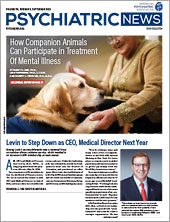A psychiatrist in private practice was struggling with a psychiatric clinic’s policy regarding new patients and contacted APA’s Ethics Committee. The administrative assistant cum intake coordinator had been instructed to ask individuals who were seeking an appointment a set of questions that would determine whether they would be accepted as new patients or not. These questions included asking about a history of suicide attempts, repeated nonsuicidal self-injury, and a family history of completed suicide. Also, the psychiatrist was aware of solo private psychiatrists who did not accept new patients who had recently been admitted to a psychiatric hospital or had a history of frequent hospitalizations.
The psychiatrist engaged in these problematic practices was motivated by an intense fear of being held liable if a patient completed suicide or seriously hurt or killed others. The psychiatrist mounted a robust defense by pointing to Section 6 of APA’s
The Principles of Medical Ethics With Annotations Especially Applicable to Psychiatry: “A physician shall, in the provision of appropriate patient care, except in emergencies, be free to choose whom to serve, with whom to associate, and the environment in which to provide medical care.”
The subject of a psychiatrist’s electing not to treat individuals whom they are uniquely qualified to treat is a thorny issue currently under discussion and review by the Ethics Committee. Doing so is understandable in certain situations, such as a known child sex offender seeking treatment from a psychiatrist with lived experience of sexual abuse in childhood. The psychiatrist may elect not to treat such individuals because the psychiatrist’s countertransference reactions may interfere with the ability to uphold the core ethics principle of acting only in the best interest of the patient. But such situations are extremely rare.
In a society where access to psychiatrists for routine outpatient care is woefully inadequate, to exclude groups of patients ab initio due to their psychiatric symptoms or presentation is a travesty. When specialist physicians such as psychiatrists casually enact policies that restrict access to care for patients, options available to patients shrink dramatically. Patients with complicated treatment needs will continue to suffer and may end up being treated by clinicians who may have less training and are consequently less equipped to care for them.
In addition to the obvious violation of Section 9 of the APA ethics guidelines—“A physician shall [emphasis mine] support access to medical care for all people”—these exclusionary policies raise other ethics questions. Are these groups of patients excluded due to bias or discrimination? Are the psychiatrists being honest with patients when they explain why they are not accepting them into their practice, honesty with patients being an important ethics injunction? Where is the compassion proposed by Section 1 of the APA ethics principles—“A physician shall be dedicated to providing competent medical care with compassion and respect for human dignity and rights”? Would these psychiatrists sincerely aver that their policies contribute to the improvement of the community and the betterment of public health, as advocated by Section 7?
Managing risky patients in outpatient psychiatry clinics can be anxiety provoking for psychiatrists because patients’ unpredictable potential to cause harm to themselves or others puts psychiatrists on perpetual alert. Additionally, interacting with these patients can be time consuming as well as physically and mentally draining. In these challenging situations, the psychiatrist should conduct a comprehensive evaluation and, if there are open spots in the clinic, treat the patients to the best of their ability, including seeking second opinions as necessary and maintaining documentation of interactions, concerns, and attempts at mitigating risks. Patients may be referred to more appropriate settings or colleagues as needed. Abandoning them at intake is unfair and potentially unethical. The social contract that has long existed between physicians and society demands more of us. ■

